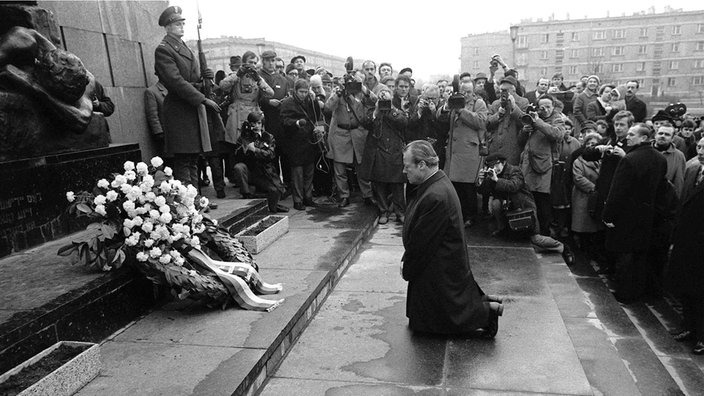With Donald Trump set to make his first visit to the UK since being elected President of the United States. Perhaps we should look at how a true statesman behaves on a visit to another nation.

The term Kniefall von Warschau, also referred to as Warschauer Kniefall, (both German for "Warsaw genuflection") refers to a gesture of humility and penance by German Chancellor Willy Brandt towards the victims of the Warsaw Ghetto Uprising.
The event took place on December 7, 1970, in Warsaw, Poland (which was then part of the Eastern Bloc), during a visit to a monument to the German occupation-era Warsaw Ghetto Uprising. After laying down a wreath, Brandt, very surprisingly, and to all appearances spontaneously, knelt. He remained silently in that position for a short time (half a minute), surrounded by a large group of dignitaries and press photographers.
Brandt had actively resisted the early Nazi regime, and had spent most of the time of Hitler's reign in exile. The occasion of Brandt's visit to Poland at the time was the signing of the Treaty of Warsaw between West Germany and the People's Republic of Poland, guaranteeing German acceptance of the new borders of Poland. The treaty was one of the Brandt-initiated policy steps (the 'Ostpolitik') to ease tensions between West and East during the Cold War.
Brandt was repeatedly interviewed about the genuflection and about his motives. He later noted that:
The boastful and racist US President or a German Chancellor who acknowledged the previous sins of his nation even though he personally had fought against them.

The term Kniefall von Warschau, also referred to as Warschauer Kniefall, (both German for "Warsaw genuflection") refers to a gesture of humility and penance by German Chancellor Willy Brandt towards the victims of the Warsaw Ghetto Uprising.
The event took place on December 7, 1970, in Warsaw, Poland (which was then part of the Eastern Bloc), during a visit to a monument to the German occupation-era Warsaw Ghetto Uprising. After laying down a wreath, Brandt, very surprisingly, and to all appearances spontaneously, knelt. He remained silently in that position for a short time (half a minute), surrounded by a large group of dignitaries and press photographers.
Brandt had actively resisted the early Nazi regime, and had spent most of the time of Hitler's reign in exile. The occasion of Brandt's visit to Poland at the time was the signing of the Treaty of Warsaw between West Germany and the People's Republic of Poland, guaranteeing German acceptance of the new borders of Poland. The treaty was one of the Brandt-initiated policy steps (the 'Ostpolitik') to ease tensions between West and East during the Cold War.
Brandt was repeatedly interviewed about the genuflection and about his motives. He later noted that:
- (German original) "Unter der Last der jüngsten Geschichte tat ich, was Menschen tun, wenn die Worte versagen. So gedachte ich Millionen Ermordeter."[4]
- (English translation) Under the weight of recent history, I did what people do when words fail them. In this way I commemorated millions of murdered people.
The boastful and racist US President or a German Chancellor who acknowledged the previous sins of his nation even though he personally had fought against them.

No comments:
Post a Comment